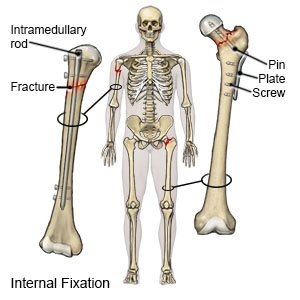ORIF of an Arm Fracture in Children
Medically reviewed by Drugs.com. Last updated on May 6, 2024.
What do I need to know about open reduction and internal fixation (ORIF) of an arm fracture?
ORIF of an arm fracture is surgery to fix a broken arm bone. Open reduction means the bones are moved back into the correct position. Internal fixation means plates, screws, pins, or wires will be used to hold the bones in place while they heal.
 |
How do I prepare my child for ORIF?
- Your child's surgeon will tell you how to prepare your child for surgery. He or she may tell you not to let your child eat or drink anything after midnight on the day of surgery.
- Tell your child's surgeon about any medicines your child is taking. He or she will tell you if your child should stop any medicine for surgery, and when to stop. He or she will tell you which medicines your child should take or not take on the day of surgery.
- Your child may need to have blood and urine tests, and arm x-rays.
What will happen during ORIF?
- Your child may be given general anesthesia to keep him or her asleep and free from pain during surgery. He or she may instead get regional anesthesia to numb the surgery area. Your child will be awake with regional anesthesia, but he or she should not feel pain. An incision will be made on or around your child's arm fracture. Your child's surgeon will use plates, screws, pins, or wires to put the broken pieces back together. Damaged blood vessels and nerves will also be fixed.
- X-rays may be taken to see if the bones are in the correct position. The wound will be closed with stitches or medical tape and covered with bandages.
What should my child expect after ORIF?
Your child will be taken to a room to rest until he or she is fully awake. Healthcare providers will monitor him or her closely for any problems. Do not let your child get out of bed until his or her healthcare provider says it is okay. When healthcare providers see that your child is okay, he or she may be able to go home.
- A cast or splint may be placed to help prevent movement so the bones can heal.
- Medicines may be given to prevent or relieve pain or nausea.
What are the risks of ORIF for an arm fracture?
Your child's arm may become stiff, numb, or weak. The hardware may loosen and move out of place. The broken arm may not heal properly. Your child may not be able to move the arm the way he or she did before the injury. Your child's broken arm may not grow as long as the other arm. Your child may develop compartment syndrome (increased pressure in his or her arm). This can damage muscles and tissue. Your child may develop a life-threatening blood clot.
Care Agreement
You have the right to help plan your child's care. Learn about your child's health condition and how it may be treated. Discuss treatment options with your child's healthcare providers to decide what care you want for your child. The above information is an educational aid only. It is not intended as medical advice for individual conditions or treatments. Talk to your doctor, nurse or pharmacist before following any medical regimen to see if it is safe and effective for you.© Copyright Merative 2024 Information is for End User's use only and may not be sold, redistributed or otherwise used for commercial purposes.
Further information
Always consult your healthcare provider to ensure the information displayed on this page applies to your personal circumstances.
